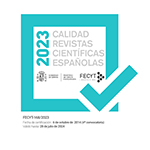Los nuevos retos ambientales y energéticos y la transición ecosocial
Resumen
El cambio climático antropogénico, la destrucción de ecosistemas, la creciente extracción de recursos, y el cénit de los combustibles fósiles, pueden colocar al capitalismo global ante retos nunca vistos en pocas décadas. Las sociedades humanas están capacitadas para pasar de estrategias maximizadoras de potencia a estrategias optimizadoras de eficiencia cuando cambia la disponibilidad energética y material, pero el bloqueo institucional y los marcos culturales están debilitando la capacidad de reacción de las sociedades contemporáneas. La creciente movilización social en favor de una transición ecosocial debería tratar de romper los bloqueos institucionales y exigir una regeneración ecosistémica que vuelva más resilientes a las sociedades. En el debate político sobre la transición identificamos cuatro narrativas, etiquetables como: tecnooptimismo economicista, capitalismo verde, Green New Deal y decrecimiento. El artículo discute las fortalezas y debilidades de las tres últimas posturas. Las posturas más colapsistas del decrecimiento se auto-condenan a la marginación política, por carecer de un plan explícito y realista para la transición. Por contra, un futuro Green New Deal podría servir de paraguas bajo el cual se desarrollen convergencias entre científicos, trabajadores, activistas y políticos, lo cual movilizaría a las fuerzas transformadoras y facilitaría la creación de nichos o centros de nucleación de prácticas potencialmente disruptoras en un previsible escenario futuro de crecimiento limitado. Provocaría también una división en las élites del poder, con una parte de ellas buscando la alianza con trabajadores, científicos y activistas. Estos factores, según Goldstone, favorecen el éxito de las movilizaciones que buscan cambios sociales importantes
Descargas
Descarga artículo
Licencia
La revista Política y Sociedad, para fomentar el intercambio global del conocimiento, facilita el acceso sin restricciones a sus contenidos desde el momento de su publicación en la presente edición electrónica, y por eso es una revista de acceso abierto. Los originales publicados en esta revista son propiedad de la Universidad Complutense de Madrid y es obligatorio citar su procedencia en cualquier reproducción total o parcial. Todos los contenidos se distribuyen bajo una licencia de uso y distribución Creative Commons Reconocimiento 4.0 (CC BY 4.0). Esta circunstancia ha de hacerse constar expresamente de esta forma cuando sea necesario. Puede consultar la versión informativa y el texto legal de la licencia.











